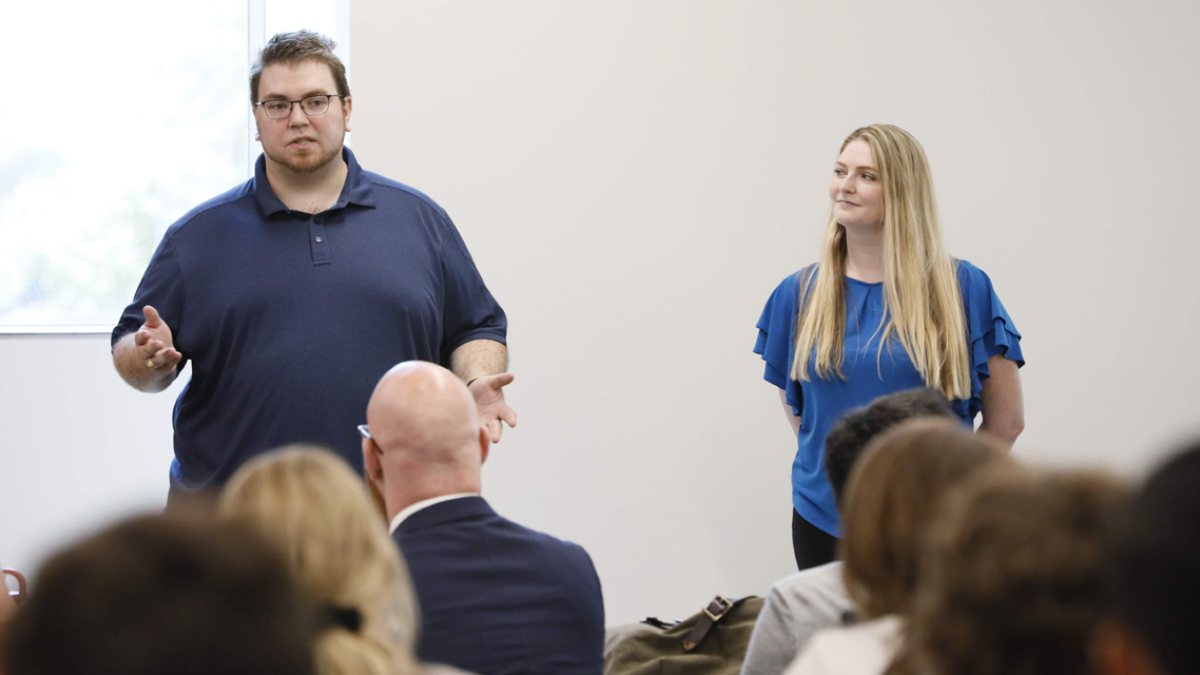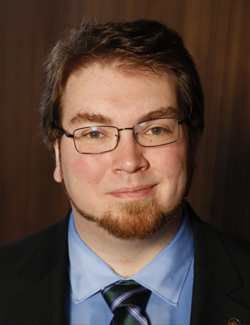Enabled by scholarship support, future lawyer finds opportunities at ASU Law

Steven Laxton (at left) presents to ASU Law students interested in the Federalist Society.
Editor’s note: This is part of a series of profiles for fall 2019 commencement.
Steven Laxton grew up in Cedar Hill, Texas and then spent his high school years in Henrico, Virginia, eventually making his way to Arizona State University's Sandra Day O’Connor College of Law to pursue a juris doctorate degree.
“I knew I was going to pursue patent law and ASU Law had a fantastic combination of high rankings, a well-developed patent program with a clinic and several relevant courses,” Laxton said. “The law school’s proximity to California for potential summer externships was also very intriguing.”
While a student at ASU Law, Laxton took advantage of multiple opportunities to gain leadership experience and network with fellow legal sector professionals. Laxton was also the recipient of two scholarships, including the Benjamin Herbert scholarship, that provided him additional time to participate in student organizations and on his academics, rather than having to focus on a job.
“My three years here at ASU Law have been fantastic. The law school’s culture is very friendly and academically helpful,” Laxton recalled. “There are also a wealth of great student organizations. I enjoyed my experiences and connections with Delta Theta Phi, the Christian Legal Society, the Federalist Society, and Jurimetrics, which together fulfilled my interests and needs.”
ASU Law sat down with him to learn more about his ASU Law journey.

Steven Laxton, Fall 2019 JD Candidate, Sandra Day O’Connor College of Law.
Question: What’s the best piece of advice you’d give to those still in law school?
Answer: Always read a case brief and a summary of black letter law before reading a case. You can save a lot of time knowing where the opinion is going, time that you can reinvest elsewhere.
Q: What are your plans after graduation?
A: I am going to Houston, Texas, to study for the February bar, and begin working as a law clerk for Judge Roy S. Payne at the Eastern District of Texas in Marshall. After that, I will look for a legal job in Texas.
Q: If someone gave you $40 million to solve one problem on our planet, what would you tackle?
A: I would develop and endow an institute for artificial intelligence and ethics akin to the K&L Gates Endowment for Ethics and Computational Technologies, but with a smaller and more refined scope. The institute would hone in on two goals. First, it would conduct legal and social research regarding political concerns with artificial intelligence technology in democratic societies. Secondly, it would provide representation of concerns such as the use of AI for speech suppression, improper statistics application, and large scale social influence.
Q: What motivates/inspires you?
A: A combination of curiosity, concern and desire to create an environment for my future children to thrive in.
Q: For what in your life do you feel most grateful?
A: Friends and family that have influenced me over the years.
Q: If you could speak directly to the philanthropists that donated for your scholarships, what would you like to tell them?
A: I’d like to tell them thank you, let them know my plans after graduation and extend an open invitation for lunch.
More Law, journalism and politics

Arizona secretary of state encourages students to vote
Arizona Secretary of State Adrian Fontes looked right and left, taking in the more than 100 students who gathered to hear him…

Peace advocate Bernice A. King to speak at ASU in October
Bernice A. King is committed to creating a more peaceful, just and humane world through nonviolent social change.“We cannot…

CNN’s Wolf Blitzer to receive 41st Walter Cronkite Award for Excellence in Journalism
Wolf Blitzer, the longtime CNN journalist and anchor of “The Situation Room With Wolf Blitzer,” will accept the 41st Walter…